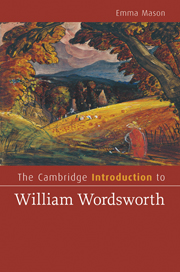Summary
Wordsworth, wrote Coleridge, ‘both deserves to be, and is, a happy man – and a happy man, not from natural Temperament’, but ‘because he is a Philosopher – because he knows the intrinsic value of the Different objects of human Pursuit, and regulates his Wishes in Subordination to the Knowledge – because he feels, and with a practical Faith, the Truth’. Coleridge, like the other members of Wordsworth's close family group (his sister Dorothy, brother John, wife Mary and sister-in-law Sara), understood Wordsworth's poetic project in a way modern critics sometimes overlook: eager to brand the poet an apostate, conservative or ego-driven solitary, Wordsworth's practical and emotional commitments to his family, community, natural world, as well as to poetry, are often underplayed. His jokey, flirtatious and good-humoured side is similarly glossed over, while his vulnerability and neuroses pale before a critical focus on his assumed narcissism.
Yet Wordsworth sought to teach people how to feel and think not because he felt confident in his own efforts to do so, but rather because he did not. John Stuart Mill considered his poetic ability in similar terms: ‘Compared with the greatest poets, he may be said to be the poet of unpoetical natures, possessed of quiet and contemplative tastes. But unpoetical natures are precisely those which require poetic cultivation.’ Far from the self-involved figure conjured by those unwilling to engage with his project, Wordsworth was above all a watcher and a listener of his world.
- Type
- Chapter
- Information
- The Cambridge Introduction to William Wordsworth , pp. ix - xiPublisher: Cambridge University PressPrint publication year: 2010

